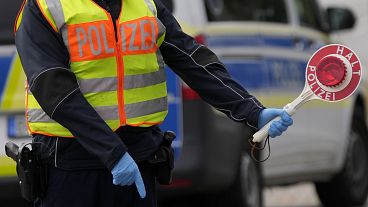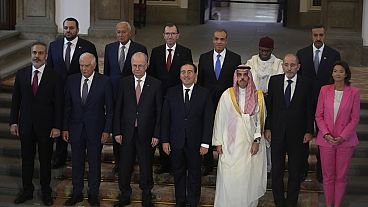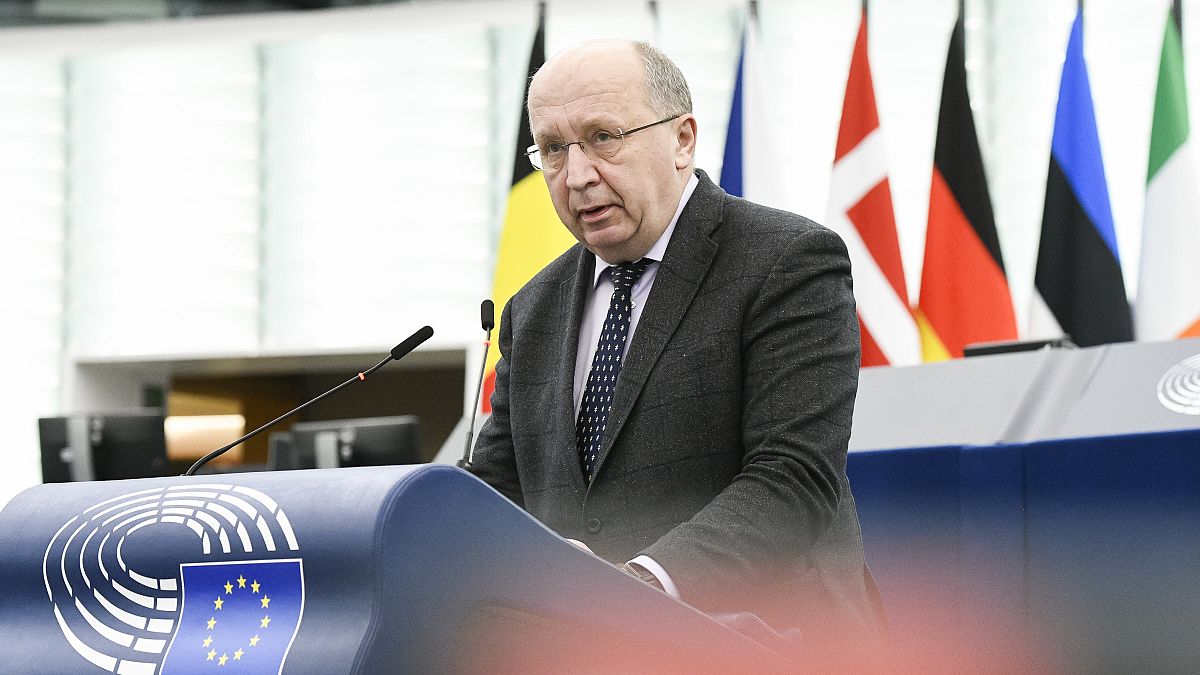Andrius Kubilius, who may lead talks for the EU executive, has supported the speedy enlargement of the bloc to Ukraine and the Balkans.
The EU should prioritise expansion over the next five years, if necessary allowing war-torn Ukraine to join the bloc in stages, Lithuania’s next European Commissioner has told Euronews.
In his remarks, Andrius Kubilius, an MEP who was twice Lithuania’s Prime Minister, stressed the geopolitical case for returning to an early-2000s philosophy that saw ten new countries join the bloc at once.
Citing his country’s security experience as Russia’s neighbour, Kubilius said he’s “looking to portfolios related with enlargement or defence,” suggesting it might be he himself that leads accession talks with the likes of Kyiv and Belgrade.
The comments come at a key moment in the formation of the executive that will govern the EU over the next five years, which will include one top official from each of the bloc’s 27 member states.
Once the slate of candidates is known – due later this week – they'll have to be assigned a policy area by Commission President Ursula von der Leyen.
Von der Leyen has already promised a new defence commissioner role, to bolster the EU industry in the wake of renewed Russian belligerence.
But, with countries such as Ukraine, Moldova and Serbia waiting in the wings to join, she could also make enlargement – the process of vetting and admitting new members — a central element of her second term, just as climate change policy was for her first, Kubilius said.
A new flagship
"Enlargement can be ... this new flagship project,” he said, citing the need to "influence how the European Union will live during the next 50 years.”
Baltic states that joined in 2004 have the right experience, he reckons. He was Prime Minister when Lithuania began its own Brussels talks in 2000 – and says the EU needs to get back to the open philosophy it had back then.
EU enlargement has taken a back seat of late; in 2014, the year after Croatia joined, von der Leyen’s predecessor Jean-Claude Juncker said there’d be no more new members under his five-year term.
The policy has now gained a geopolitical boost: Brussels — keen to show its political support in the wake of the 2022 Russian invasion — formally opened talks with Kyiv in June.
Kubilius suggests there could now be some flexible thinking from Brussels: he told Euronews that smaller countries could join before the larger Ukraine, and that accession could be gradual.
“There are even some ideas that, first of all, the country should jump into the single market, then should go with all other chapters: so-called progressive integration or phased integration,” he said.
"Kyiv needs to make all their reforms, and we need to assist them in how to implement,” he added.
China troubles
As an MEP he’s supported concluding the next wave of expansion by 2030, a deadline he admits is ambitious.
There’s both an economic and geopolitical rationale to do so, he said – and Lithuania’s recent run-in with another great power shows that the two can’t always be kept separate.
In 2021, China limited imports from Lithuania in a diplomatic spat over the status of Taiwan, which Beijing regards as part of its territory – and Kubilius says the EU needs to “learn lessons” from that incident.
“If you have economic relations with a country which is not a democratic one — we have that with Russia, with Belarus — we should be ready for any kind of such development as we have seen in our trade with China,” he said.
The 2021 Chinese embargo prompted a case at the World Trade Organisation, and new EU measures to stop foreign countries exerting political coercion via trade policy.
Kubilius, Prime Minister from 1999-2000 and 2008-2012 – has been an outspoken Russia hawk during his time as an MEP, where he sits with the centre-right European People’s Party (EPP).
He’s branded Russia a state sponsor of terrorism, and has called for the seizure of hundreds of billions in Russian state assets currently parked in Europe.
A surprise choice
It was only recently that he was considered a likely Commissioner pick.
Foreign Minister Gabrielius Landsbergis had been widely tipped for the role — until it became apparent that President Gitanas Nausėda, a political independent, would veto.
Kubilius said he received the call from the Prime Minister while cycling in northern Estonia – a trip that had to be abruptly curtailed.
While he has his own portfolio preferences, he admits his government or party might differ. The final decision rests with von der Leyen, and important roles are likely to be stretched thin among the 26 she must dole out.
A further hurdle could lie with the European Parliament, whose members may question the lack of gender balance when they vote to approve the Commission into office.
Despite von der Leyen’s diversity pledge, women may end up representing as few as seven of her Commission’s 27 members.
Lithuania – like every other EU member state – ignored von der Leyen’s request to propose both male and female names for the Commissioner role, which Kubilius attributes to the complexity of domestic procedures.
“For us even to nominate one candidate is quite a challenge,” he said. “To nominate two candidates — perhaps it would be almost not an achievable result.”
He hopes MEPs will look beyond gender, and at competence – even if he acknowledges the outcome is uncertain.
“Gender balance is very important, but also experience, track record,” he said.
"What kind of decision will be made?” he asked of the hearings and vote likely to take place in the autumn. “You know, democracy is democracy, you never can predict what will be the outcome.”












